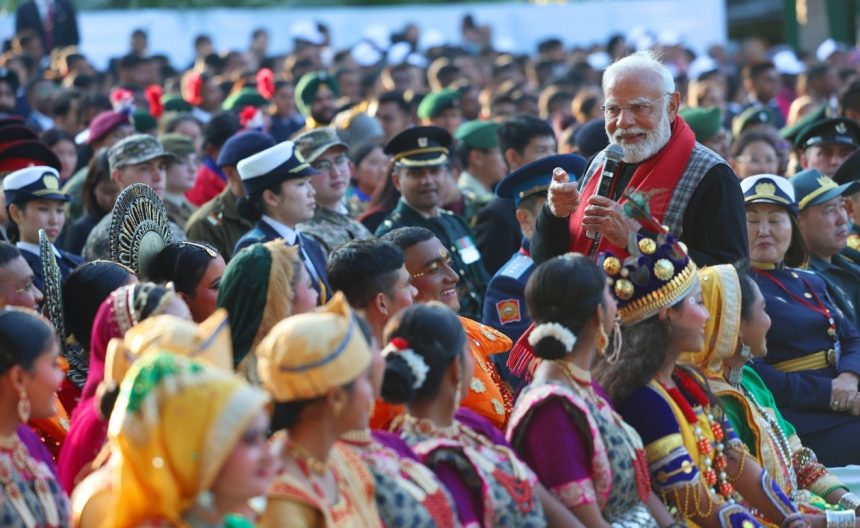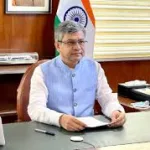For generations, the societal norms established many discriminatory standards to oppress women, and especially those who lived in rural, impoverished conditions, with no access to quality education, decent health, work opportunities, and political voice. Subtle and not-so-subtle gender discrimination was routinely embedded in both mindset and institution. But since 2014, India has shifted paradigms regarding the perspective of women, and the role of women in India.
Under Prime Minister Narendra Modi, women were no longer viewed as passive victims of aid – they were no longer collateral to the development agenda – they represented the opposite of collateral, they were the pivot point. “Nari Shakti” became not only a slogan, but also a national campaign. Not only is the role of women in India’s economy growing – in real tangible and measurable terms – it is being celebrated all over India as they transition from roles in their homes to the highest offices of power.
Maybe some of the most significant change was in the form of lifecycle approach. Instead of one intervention or one development process – empowerment was now portrayed as a journey. The journey begins at birth and the support of women development all the way through to the final moments of life’s journey. Mindset around empowerment meant that women were provided support throughout their transitional life, irrespective of life, personal, or professional ambitions.
The government initiated these changes with constitutional norms and legal reform, first creating constitutional safeguards, and strengthening laws and mechanisms for implementation, to protect against violence and discrimination. As a result, there were laws to protect women and girls from violence and discrimination. At the same time, initiatives such as ‘Beti Bachao Beti Padhao’ were launched to create awareness, action, and celebration of the girl child, and to safeguard her rights, especially in districts where the child sex ratio is lower.
Education was another key focus area. For example, government programs continued to invest in separate sanitation facilities in schools as part of the ‘Swachh Vidyalaya Abhiyan’ to help young girls continue getting an education with dignity. The sanitation facilities contributed towards creating a better environment, which had a positive impact on retention in schools and was likely the start of building a foundation for the future.
The fundamental need towards the finances of young girls was addressed through the ‘Sukanya Samriddhi Yojana’. With over Rs 3 lakh crore of savings in over 4.2 crore accounts, families that opened an account were given a commitment for their daughter; beyond that, it gave families an additional reason to save money and realize their daughter’s potential both economically and emotionally. This too helped change mindsets at the family and community level as it was built around value.
Women’s participation in economic activities also had exponential growth. The MUDRA Yojana was established which enabled millions of women to be business owners and start their own business. Women represented almost68% of beneficiaries. This demonstrated that women can not only exist in the job market from an employment perspective, but when given access, women can be successful entrepreneurs and job creators within their community.
The opening up of defence forces for women brought a revolutionary change in national perspective towards women’s roles. Girls got entry to Sainik Schools. Women got a permanent commission in the Forces. This dismantled old prejudices and enabled young girls to think of aspiring to careers which had seemed out of reach. A second area of empowerment was women in the family. Under PM Awas Yojana, 73% of the houses have been registered in the names of women solely or jointly. This gave women legal ownership, but also increased their confidence and respect in the family.
In health and nutrition, Mission POSHAN 2.0 was particularly tailored towards children, adolescent girls, pregnant women and lactating mothers. A total of more than Rs 1.81 lakh crore was invested by the Government of India to empower the nutrition ecosystem modernly and through the community. Under the Mission we integrated early education with nutrition aiming for children under six through Poshan Bhi Padhai Bhi, establishing assured nutrition as well as early education through upgraded Anganwadi centres. This framed early childhood care and education as preparation for long term learning outcomes.
As part of the 15th Finance Commission cycle, the government committed to modernizing 2 lakh Anganwadi Centres. More than 24,500 have been transformed into new Saksham Anganwadis by 2025. These Anganwadis are not merely nutrition centres but, rather, community engagement and knowledge generating centres.
The Poshan Tracker – a digital monitoring solution –Scored the Award for being innovative and efficient in providing public service. It provides 24/7 monitoring and service delivery or Aadhaar authentic verification including biometric and facial verification for transparency in understanding service delivery of Take-Home Ration. The tracker has been recognised as a global digital transformation governance model for maternal and child welfare.
Nutrition at the local level has seen additional support through the Suposhit Gram Panchayat Abhiyaan which was launched in December 2024. This campaign rewards villages that are eligible as being top performing villages demonstrating significant change in improvement in community nutrition that demonstrates leadership locally, Leadership in National Development.
Another flagship program is the Universal Immunization Programme (UIP), which each year immunizes almost 2.9 crore pregnant women. These mothers receive lifesaving vaccines and their newborns get immunized preventing disease and death, which has been a key intervention to reduce maternal and under-5 mortality.
The Janani Shishu Suraksha Karyakram (JSSK) has saved money for mothers by covering their antenatal and postnatal care including the crucial first 48-hours of life. Since being scaled up in 2014, over 16.6 crore women and children have accessed these services. To strengthen the JSSK, the Janani Suraksha Yojana (JSY) provided cash transfers conditional upon facility births (or institutional deliveries) for mothers.
To date, over 11 crore women have been covered under the programme, particularly in rural areas where they had no access to safe delivery solutions, making delivery safer for mothers and babies. To maintain respectful and quality care at a local level, the ‘Surakshit Matritva Aashwasan’ (SUMAN) scheme aimed to provide zero-financial healthcare costs mothers and newborns, ensuring they receive care where they live. As of March 2025, over 90,000 certified health facilitites were providing these services to mothers and newborns, showing confidence in public healthcare systems, which is a good outcome.
The ‘Pradhan Mantri Surakshit Matritva Abhiyan’ (PMSMA) provides women with antenatal check-ups during their early pregnancy. Early complications can be detected and treated making the scheme a very effective intervention to save women’s lives, lowering maternal mortality rates, and enhancing women’s knowledge around their own bodies. The scheme continues to drive evidence of women’s rights to get access to healthcare and follow up care in their own right.
‘Pradhan Mantri Matru Vandana Yojana’ (PMMVY) cash transfers were made directly to pregnant and lactating mothers to provide for an adequate diet and health care in pregnancy and to improve health and nutrition practices in early motherhood when development and nutrition are critical. PMMVY will reduce financial stress and could lead to changes in behaviors and practices among moms.
Menstrual hygiene has been neglected for too long and over 77 crore sanitary pads were made available at a meager Rs 1 through Jan Aushadhi Kendras, thereby making sanitary health a right for every woman as sanitary products were made affordable and available to rural and semi-urban women. Access to safe tap water connections through the Jal Jeevan Mission benefitted over 15 crore households. This not only benefitted women by lightening the load of securing water, but it also improved hygiene and improved health outcomes by reducing water-borne diseases and reduced time poverty.
More than just policies and programs, an important transformation has occurred with the prevailing mindset. Today, women are not regarded as dependents but leaders. They participate in self-help groups, cooperatives, and local governing communities, and even parliament through landmark practices such as the ‘Nari Shakti Vandan Adhiniyam’, which reserved 33% of seats for women in our legislative process.
When you examine the fields of STEM, civil services, sports, defence, and aviation, Indian women are rising to the top; they are leading missions to Mars, flying fighter jets, and SHG women who starting businesses. All this is contributing to a silent revolution that is now loud and proud! After 11 years of endeavoring women’s empowerment, the point has been made, women’s empowerment is not a charitable cause, it is to invest in the nation’s future! When women grow and thrive, families grow, communities thrive, and nations prosper.
As India steps into Amrit Kaal, the next 25 years will be determined by how well we tap into the full potential of the women of India. The last ten years helped our society set the stage. Now we must build on it with purpose, equality, and togetherness. The women of India no longer wait for change to happen; they are making it happen. Nari Shakti is not only one of the drivers of national growth—it is the driving force of a new India.
(Author is Chairman, Centre for Narendra Modi Studies (CNMS) and Convenor of Women Led Development Conclave www.namostudies.com. Email: [email protected])








